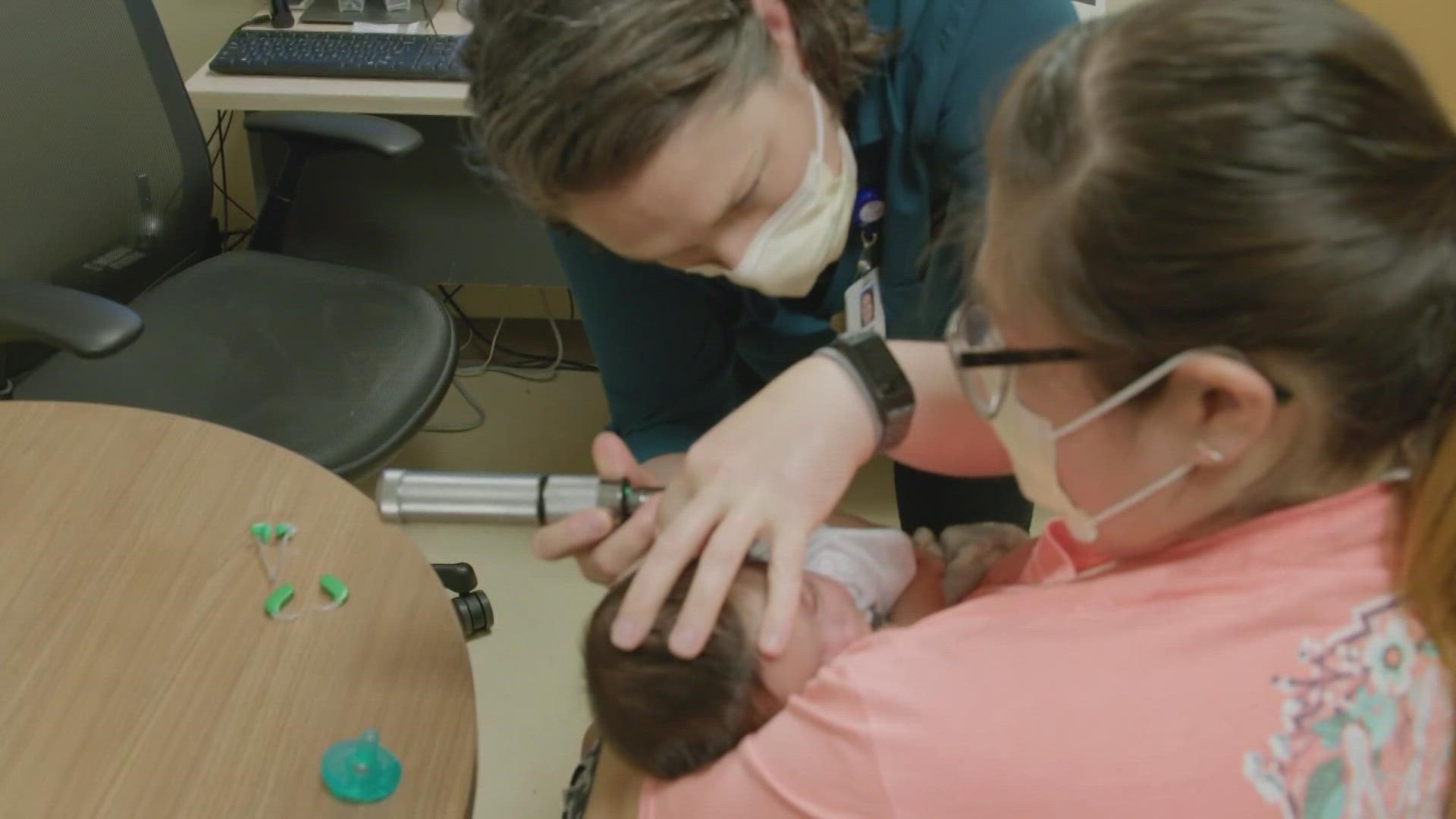SAN ANTONIO — Detecting and treating hearing loss in the first few months of life is imperative a child's health.
When it comes to premature babies, who can end up in the NICU for a long time, there's a higher incidence of hearing loss. The problem: Insurance companies typically won't pay for hearing aids while babies are in NICU, resulting in developmental delays that can last a lifetime.
"He was 2 pounds, 12 ounces. And when they did his hearing test, they were saying that he wasn't able to hear what was going on," said Alexandria Zamora, whose son, Jeremiah, spent three months in University Hospital's NICU.
It was there that they quickly discovered he had moderate hearing loss.
"I didn't know how to react at the moment because I didn't know how I would be able to accommodate him," Zamora said.
Dr. Robin Tellez, an audiologist with University Health, said early access to sound, typically through a parent's speech, is essential for babies as they develop communication for themselves.
According to Tellez, every state has their own version of a special technology meant to help diagnose hearing problems early on. Here it's called Texas Early Hearing Detection and Intervention, or TEHDI.
"That's the requirement, is that all birth hospitals facilities are offering a newborn hearing screening before babies leave the hospital. That should be happening whether they're a well baby or they're in a NICU setting; the type of setting they're in would dictate the type of testing that's done," Tellez said. "But regardless of the setting, they should be having a newborn hearing screening."
Those results are tracked by individual states, Tellez added.
Some warning signs of newborn hearing loss include the baby not responding to sudden sounds; not moving or waking up at the sound of nearby voices while sleeping; not becoming quiet at the sound of familiar voices; not turning to look at a sound they can't see; and not making simple vowel sounds.
"If children are having a lot of ear infections, that could be a put them at risk for some hearing loss as well," Tellez added.
If your child shows signs of hearing loss in the newborn test, experts say following up is extremely important. According to Tellez, many Texas parents don't.
"When (a) baby leaves the hospital, if they fail their newborn hearing screening, what's supposed to happen is they have outpatient follow-up and that should be scheduled before they leave the hospital or shortly after," she said. "But a lot of times families don't show up, or sometimes those referrals just don't get make it to their final destination where they're supposed to. So oftentimes babies will fail the newborn screening."
That, she said, can cause confusion for doctors who don't know whether or not a newborn needs further help for their hearing.
Tellez also told us how the process of finding an audiologist works here in San Antonio.
"That's typically the model that is used, is to see the pediatrician, because (in) most places an insurance is going to require a referral from what we call the PCP, and then making sure that you're getting actually seen by a pediatric audiologist," she said. "There are websites that you can go to that you can put in your zip code and it'll tell you what's the closest pediatric audiologist."
Those same websites can also provide information on what insurance a particular audiologist accepts, as well as their medical specialty.
Jeremiah, meanwhile, eventually received his molded hearing aid, which is one option available for newborns.
"It's a good day because he gets to hear us," Zamora said.
"If you really are concerned about their hearing or development in general, and if you're not getting the response you want," Tellez said, "get a second opinion."
---
>MORE WEAR THE GOWN STORIES:
- Wear The Gown: What you need to know about the risks and symptoms of lung cancer
- Wear The Gown: San Antonio mother and nurse tells story of her child battling RSV
- How going to multiple doctors can increase your risk of opioid overdose | Wear the Gown
- The history of vaccinations and keeping up with your shots | Wear The Gown
>TRENDING ON KENS 5 YOUTUBE:

